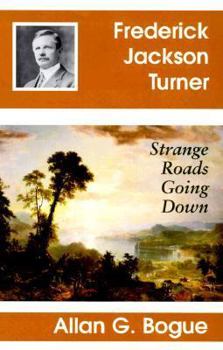Frederick Jackson Turner: Strange Roads Going Down
Cognizant of revisionist historians' reproach of Turner's philosophy set forth in his seminal 1893 essay, The Significance of the Frontier in American History, as promoting an exploitationist myth of... This description may be from another edition of this product.
Format:Hardcover
Language:English
ISBN:0806130393
ISBN13:9780806130392
Release Date:January 1998
Publisher:University of Oklahoma Press
Length:557 Pages
Weight:2.10 lbs.
Dimensions:1.6" x 6.4" x 9.5"
Customer Reviews
2 ratings
Fundamental Nessicity
Published by Thriftbooks.com User , 15 years ago
"Strange Roads Going Down" a biography and analysis of Frederick Jackson Turner, is a fundamental part of anyone's library interested in 19th century American History. Although Turner wrote from the perspective of a 19th century man, he is generally very accurate and gives historians a point of view that was immediate and active. This is an interesting counterpoint to modern historians who, by necessity are looking back in time, not at the time itself. The biography is well written and handles Turner's work effectively.
An Important Analysis of the life of the Historian who Proposed the "Frontier Thesis"
Published by Thriftbooks.com User , 18 years ago
Frederick Jackson Turner was a giant as an interpreter of the history of the United States, and this biography is an important analysis of his life and career written by a senior scholar in the history of the American West. He is the author of the "Frontier Thesis," a seminal theme through much of the twentieth century in explaining the exceptionalism of the United States. Turner's 1893 "Frontier Thesis" paper is perhaps the most influential essay ever read at the American Historical Association's annual conference. Turner took as his cue an observation in the 1890 U.S. census that the American frontier had, for the first time, closed. He noted, "Up to our own day American history has been in a large degree the history of the colonization of the Great West. The existence of an area of free land, its continuous recession, and the advance of American settlement westward explain American development." He insisted that the frontier made Americans American, gave the nation its democratic character, and ensured the virtues of self-reliance, community, and the promise of justice. He noted that cheap or even free land provided a "safety valve" that protected the nation against uprisings of the poverty-stricken and malcontented. The frontier also produced a people with "coarseness and strength...acuteness and inquisitiveness, that practical and inventive turn of mind . . . [full of] restless and nervous energy...that buoyancy and exuberance which comes with freedom." It gave the people of the United States, in essence, virtually every positive quality they have ever possessed. The "Frontier Thesis" has enjoyed both eloquent critics and defenders over the years and Allan Bogue's biography of Turner placed the famous theory front and center in his life. But Bogue also focuses on other aspects of Turner's career, his education at John Hopkins University, his slow building of the history department at the University of Wisconsin, and his move to Harvard University. Central to Bogue's study is the fundamental question that many have pondered about Turner, his brilliance in essays of broad scope and provocative nature such is his 1893 paper coupled with this failure to produce a healthy body of books on various aspects of American history. He found writing one of the most difficult tasks of his life and really only wrote one book-length work, "Rise of the New West, 1819-1829," published in 1906 as a part of the "American Nation" series edited by Albert Bushnell Hart. In later years Hart believed one of his greatest successes was extracting--and that may be the best characterization of the tortured effort to complete the manuscript--this book out of Turner. Hart quipped that he wanted it included on his tombstone as an epitaph. While Turner is largely remembered for his "Frontier Thesis," he also developed an important set of ideas about the role of geographical sections in the development of the United States. Most of his later historical work revolved aroun






